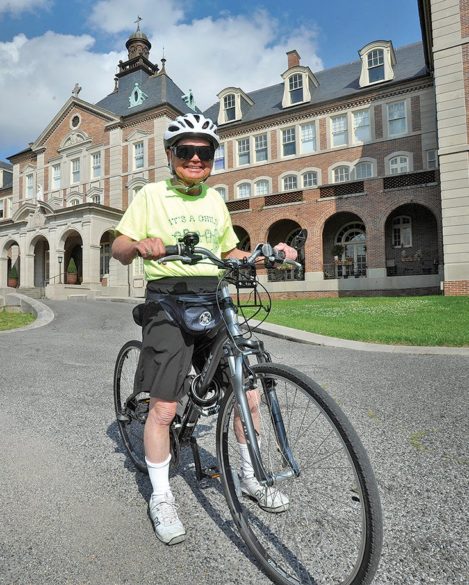By Peter Finney Jr.
NEW ORLEANS (CNS) – Retired Archbishop Alfred C. Hughes of New Orleans will turn 90 in December, but the bike rack on his car at Notre Dame Seminary proclaims, in a fittingly understated way, that God isn’t finished with him yet.
He still cycles to Audubon Park in New Orleans every Sunday – “That’s the safest day to ride in the city!” – swims daily during the summer in the Notre Dame Seminary pool, provides ongoing spiritual direction for seminarians, priests and religious – “I’ve had to cap it at 30” – and spends every Friday afternoon sitting and praying with the residents of Project Lazarus, the archdiocesan shelter and ministry to homeless men and women with AIDS.
He just finished another book – “Priests in Love with God and Eager to Witness to the Gospel” – and lives out another chapter each day with his cheerful witness.
He’s known as the Katrina archbishop for shepherding the archdiocese during Hurricane Katrina 17 years ago.

Archbishop Hughes recalls being inside the adoration chapel at Our Lady of Mercy Parish in Baton Rouge. It finally had become apparent that the floodwalls of the 17th Street Canal had collapsed and Lake Pontchartrain was angry and winning.
“I was just overwhelmed and didn’t know where to begin or what to say or do,” Archbishop Hughes said. “I was putting this all on the Lord, and, of course, the Lord was remaining silent.”
And then, at the end of the hour he said it struck me that the Lord was not saying anything, “but he’s present, and he’s expressing through his presence – support.”
“So, what I say or what I do may be secondary to being God’s presence to the people. That brought inner peace to me,” he told the Clarion Herald, archdiocesan newspaper of New Orleans.
In his life as a priest, spiritual director, seminary rector and bishop, Archbishop Hughes has been masterful in helping others calm the troubled waters churning within themselves. The pitched-fork battles that characterize our social interactions these days – as a nation and as a church – cry out for healing.
Those neuralgic divisions over social policy and the obvious lack of fair play in public discourse are not going to be solved overnight. In his years of spiritual mentorship, Archbishop Hughes says healing must start with a personal commitment to examine our own lives.
“The No. 1 step that’s very helpful to take is to be faithful to some space and time each day of quiet to be present to God,” Archbishop Hughes said. “If we don’t step back from the swirl of messages and emotions going on around us, we’re not going to get sufficient distance to see reality more objectively and sort out truth from falsehood or half-truth. And, we’re not going to experience the peace in ourselves that the world needs so much to receive from us.
“If we’re going to be able to make some positive contribution, we first have to be faithful to a regular time of placing ourselves before God and asking him for the grace to see ourselves, to see other people, to see the world and all that’s going on, and even to see the demonic, as they are and, with his eyes, learn what it is he wants me personally to try to do that reverses, in some small way, and counters evil with good.”
(Finney is executive editor/general manager of the Clarion Herald, newspaper of the Archdiocese of New Orleans.)
